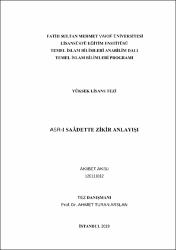| dc.contributor.advisor | Arslan, Ahmet Turan | |
| dc.contributor.author | Aksu, Akıbet | |
| dc.date.accessioned | 2020-02-04T13:28:59Z | |
| dc.date.available | 2020-02-04T13:28:59Z | |
| dc.date.issued | 2019 | en_US |
| dc.identifier.citation | AKSU, Akıbet, Asr-ı Saâdette Zikir Anlayışı, Fatih Sultan Mehmet Vakıf Üniversitesi Lisansüstü Eğitim Enstitüsü Temel İslam Bilimleri Anabilim Dalı, Yayımlanmamış Yüksek Lisans Tezi, İstanbul 2019. | en_US |
| dc.identifier.uri | https://hdl.handle.net/11352/3018 | |
| dc.description.abstract | Zikir; anmak, hatırlamak, bir şeyi unutmayıp zihinde tutmak, şan, şeref ve
şöhret gibi anlamlara gelmektedir. Zikir, ibadet ederken, bir işle meşgul olurken, her
zaman ve zeminde Allah’ı anmak, O’nu hatırdan hiç çıkarmamaktır. Kul ile Allah
arasındaki bağın sürekli canlı kalması zikirle gerçekleşebilir.
İlâhi emanetleri yüklenen insanın kulluk görevlerinden biri de Allah’ı
zikirdir. Zikir; dil, kalp ve beden ile gerçekleşir. Kur’an okumak, tehlil, tesbih, esmâi
hüsnâ, dua vb. cümleleri söylemek dil ile zikir iken, Allah’ın yarattığı kâinatı ve
içindekileri tefekkür ederek yüce yaradanı kalbinde yüceltmek kalp ile zikir, bedenin
organlarını emir ve yasaklara uygun halde kullanmak ise beden ile zikirdir.
Çalışma, üç bölümden oluşmaktadır;
1.Bölümde zikrin tarifi, Kur’an’da geçtiği yerlerdeki anlamları, zikir çeşitleri,
zikrin önemi ve amaçlarına değinilmiştir.
2.Bölümde zikrin hadislerdeki anlamları, zikir çeşitleri ve Hz. Peygamber’in
zikre teşviki konuları ele alınmıştır.
3.Bölümde ise Hz. Peygamber’in Allah’ı nasıl zikrettiğini, sahâbe ve tâbiînin
zikir uygulamaları açıklanmıştır. | en_US |
| dc.description.abstract | Dhikr (mentioning) has some meanings like; recalling, remembering and
saying over and so on, while it means also glory and magnificence. Dhikr means not
to forget Allah during the worship or any work. Since the relationship between Allah
and the servant will stay fine via Dhikr.
Human, who have offered and accepted the Trust The Holy Quran: 33/72),
have another essential worship which is called “Dhikr”. Dhikr consists of actions of
hearth, tongue and body. Reciting the Holy Qur’an and glorifying the God are some
of the actions of the tongue; on the other hand, the hearth has some worship which
stand for Dhikr like thinking about genesis of the universe and sanctification of the
God. In addition, obeying to Allah and acting according to his orders are Dhikr of the
all body.
Our study consists of three parts;
In the first part of our study, we gave brief definition of dhikr and what it
means in the places where it is mentioned in the Quran. Also we tried to talk about
its importance and its different variants.
In the second part of the study, we talked about its means in sayings of the
prophet (PBUH) and his opinions about dhikr.
In the last part, we explained how the prophet Muhammed (PBUH) was
performing dhikr and Muslims who were living with him who are called as
companions. | en_US |
| dc.language.iso | tur | en_US |
| dc.publisher | Fatih Sultan Mehmet Vakıf Üniversitesi, Lisansüstü Eğitim Enstitüsü | en_US |
| dc.rights | info:eu-repo/semantics/openAccess | en_US |
| dc.title | Asr-ı Saâdette Zikir Anlayışı | en_US |
| dc.title.alternative | Notion of (Dhıkr) Mentioning in the Blessing Century | en_US |
| dc.type | masterThesis | en_US |
| dc.contributor.department | FSM Vakıf Üniversitesi, Lisansüstü Eğitim Enstitüsü | en_US |
| dc.relation.publicationcategory | Tez | en_US |
| dc.contributor.institutionauthor | | |
| dc.contributor.institutionauthor | Aksu, Akıbet | |



















